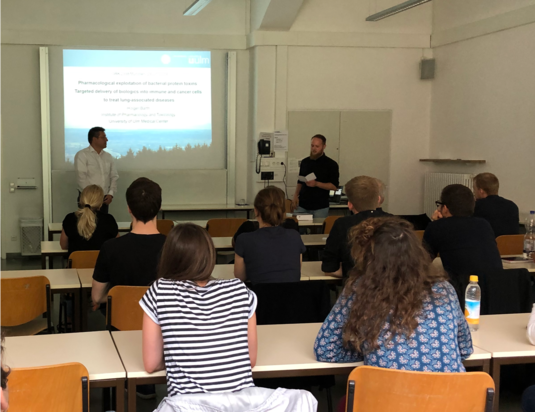GRK 2338 Seminar - Holger Barth
Institute of Pharmacology and Toxicology, University of Ulm Medical Center
29.07.2019 at 16:00
Title: Pharmacological exploitation of bacterial protein toxins: Targeted delivery of biologics into immune and cancer cells to treat lung-associated diseases
Prof. Dr. Holger Barth visited the GRK 2338 RTG and gave a talk about pharmacological exploitation of bacterial protein toxins. Afterwards, the students had the opportunity to speak to him personally during a meet-the-speaker session.

Time:
4.00 pm GRK 2338 Lecture
5.00 pm Meet the Speaker Session
Venue:
Pettenkoferstr. 12, D 1.34
Host: Thomas Gudermann (P10)
PhD Host: Christian Schremmer (P04)
The major research interest of Holger Barth is in the transport of proteins and peptides across cell membranes, a process of central scientific and medical importance, which is still not sufficiently understood. Membrane-translocation is essential for toxins and therapeutic compounds that act inside human cells. Many pharmacologically active proteins and peptides (biologics) are not able to translocate across membrane barriers and therefore do not reach their therapeutic targets in the cytosol of target cells or in the central nerve system, which prevents their therapeutic use.
We and others discovered that bacterial protein toxins enter human cells as efficient protein transport machines and act as highly potent and specific enzymes in the cytosol of target cells. The toxin-catalyzed substrate modification results in cell damage and the characteristic clinical symptoms associated with the individual toxins and toxin-producing bacteria. We identified molecular mechanisms underlying their uptake into cells and found that for most toxins, a separate transport subunit binds to cell receptors, triggers endocytic internalization and finally the transport of the enzyme subunit across endosomal membranes into the cytosol. The novel knowledge has fundamental implications for the understanding of cellular membrane transport and is directly transferred into pharmacological applications:
- We develop novel pharmacological inhibitors which prevent the uptake of bacterial toxins into cells, which is an attractive therapeutic option against toxin-induced diseases caused by infections with bacteria that are (multi)resistant towards most antibiotics, a fundamental medical problem nowadays [1].
- We exploit bacterial toxins to investigate the role of Rho-GTPases and actin as therapeutic targets in the context of trauma, inflammation, cancer and bone diseases. The excessive invasion and activation of neutrophils (PMN) and monocytic cells into the lungs after trauma and the release of their toxic mediators essentially contribute to alveolar barrier breakdown leading to acute lung injury/acute respiratory distress syndrome (ALI/ARDS). We exploited Rho-inhibiting toxins to selectively prevent monocyte migration in vitro, ex vivo and into the lungs of mice after thorax trauma [2]. This approach should be beneficial to multi-trauma patients and will be further optimized in the CRC1149. We are currently developing PMN-selective toxins and expect that the understanding and targeted pharmacological modulation of enhanced PMN recruitment is key for future treatment of trauma-induced ARDS.
- We exploit non-toxic portions of bacterial toxins to develop modular nanomachines for the targeted delivery of therapeutic (macro)molecules into the cytosol of human target cells, which is the bottle-neck of many available cellular transport systems. In the CRC1279, we developed a series of “smart” biohybrid nanotransporters using biotin/avidin technology. We provided proof-of-concept for this innovative approach by introducing C3 Rho-inhibitor into the cytosol of tumor cells and human xenograft lung tumors, thereby inhibiting tumor growth and vascularization [3].
[1] Schnell L, et al., Barth, H. (2019). Revisiting an old antibiotic: Bacitracin neutralizes binary bacterial toxins and protects cells from intoxication. FASEB J. DOI 10.1096/fj.201802453R.
[2] Martin T, et al., Barth, H. (2018). Rho-inhibiting C2IN-C3 fusion toxin inhibits chemotactic recruitment of human monocytes ex vivo and in mice in vivo. Arch. Toxicol. 92, 323-336.
[3] Kuan SK et al., Barth H*, Weil T* (2018). Boosting anti-tumor drug efficacy with chemically engineered multidomain proteins. Adv. Sci. 5, 1701036. DOI: 10.1002/advs.201701036.

